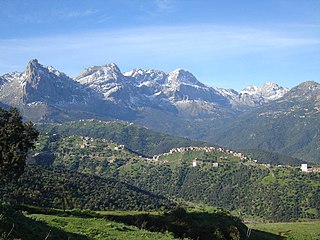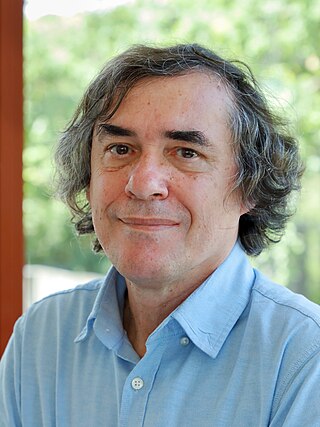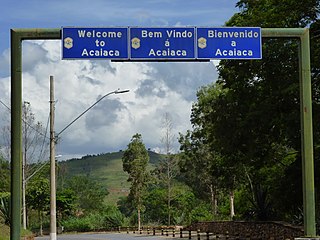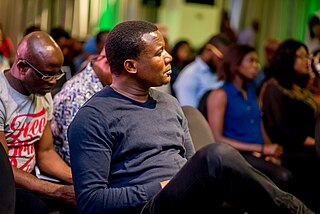
Occitan, also known as lenga d'òc by its native speakers, sometimes also referred to as Provençal, is a Romance language spoken in Southern France, Monaco, Italy's Occitan Valleys, as well as Spain's Val d'Aran in Catalonia; collectively, these regions are sometimes referred to as Occitania. It is also spoken in Calabria in a linguistic enclave of Cosenza area. Some include Catalan in Occitan, as the linguistic distance between this language and some Occitan dialects is similar to the distance between different Occitan dialects. Catalan was considered a dialect of Occitan until the end of the 19th century and still today remains its closest relative.

Kabylia or Kabylie is a mountainous coastal region in northern Algeria and the homeland of the Kabyle people. It is part of the Tell Atlas mountain range and is located at the edge of the Mediterranean Sea.

Francisco Buarque de Hollanda, popularly known simply as Chico Buarque, is a Brazilian singer-songwriter, guitarist, composer, playwright, writer, and poet. He is best known for his music, which often includes social, economic, and cultural reflections on Brazil.
Tamazgha is a fictitious entity and neologism in the Berber languages denoting the lands traditionally inhabited by the Berber peoples within the Maghreb. The term was coined in the 1970s by the Berber Academy in France and, since the late 1990s, has gained particular significance among speakers of Berber languages. Although Berberists see Tamazgha as the geographic embodiment of a Berber imaginary of a once unified language and culture that had its own territory, it has never been a single political entity, and Berbers across the Maghreb did not see themselves as a single cultural or linguistic unit, nor was there a greater "Berber community" due to their differing cultures and languages. Despite this, certain Berberists such as members of the Algerian separatist Movement for the Self-Determination of Kabylia use the term to imagine and describe a hypothetical federation spanning between the Canary Islands and the Siwa Oasis, a large swathe of territory including Morocco, Algeria, Tunisia, Libya, Mauritania, Mali, Niger, Egypt, the Western Sahara, Burkina Faso and Senegal.

Kabyle or Kabylian is a Berber language spoken by the Kabyle people in the north and northeast of Algeria. It is spoken primarily in Kabylia, east of the capital Algiers and in Algiers itself, but also by various groups near Blida, such as the Beni Salah and Beni Bou Yaqob.
Talian, or Brazilian Venetian, or Vêneto is a Venetian dialect spoken primarily in the Serra Gaúcha region in the northeast of the state of Rio Grande do Sul in Brazil. It is also spoken in other parts of Rio Grande do Sul, as well as in parts of Espírito Santo and of Santa Catarina.

Occitania is the historical region in Southern Europe where the Occitan language was historically spoken and where it is sometimes used as a second language. This cultural area roughly encompasses much of the southern third of France as well as part of Spain, Monaco, and parts of Italy.

Lounès Matoub was an Algerian Kabylian singer, poet, and thinker who sparked an intellectual revolution, and mandole player who was an advocate of the Berber cause, human rights, and secularism in Algeria throughout his life.

Berberism is a Berber ethnonationalist movement, that started mainly in Kabylia (Algeria) and Morocco during the French colonial era with the Kabyle myth and was largely driven by colonial capitalism and France's divide and conquer policy. The Berberist movement originally manifested itself as anti-Arab racism, Islamophobia, and Francophilia, that was sanctioned and sponsored by French colonial authorities. The movement later spread to other Berber communities in the Maghreb region of North Africa and was facilitated by colonial policies such as the Berber Dahir. The Berberist movement in Algeria and Morocco is in opposition to cultural Arabization, pan-Arabism and Islamism.

Vergílio António Ferreira, JOSE was a Portuguese writer, essayist, professor and a key figure in Portuguese-language literature. His prolific literary output, comprising works of fiction, philosophical essays and literary diaries, are generally divided into neorealism, dominant in Portuguese fiction at the time, and existentialism.

Mircea Cărtărescu is a Romanian novelist, poet, short-story writer, literary critic, and essayist.

The Kabyle people are a Berber ethnic group indigenous to Kabylia in the north of Algeria, spread across the Atlas Mountains, 160 kilometres (100 mi) east of Algiers. They represent the largest Berber population of Algeria and the second largest in North Africa.

Portuguese is the official and national language of Brazil being widely spoken by most of the population. Brazil is the most populous Portuguese-speaking country in the world, with its lands comprising the majority of Portugal's former colonial holdings in the Americas.

Ostana is a comune (municipality) in the Province of Cuneo in the Italian region Piedmont, located about 60 kilometres (37 mi) southwest of Turin and about 45 kilometres (28 mi) northwest of Cuneo. Its population has been in decline and in January 2016 it recorded its first birth since the 1980s.

Joseph Étienne Frédéric Mistral was an Occitan writer and lexicographer of the Provençal form of the language. He received the 1904 Nobel Prize in Literature "in recognition of the fresh originality and true inspiration of his poetic production, which faithfully reflects the natural scenery and native spirit of his people, and, in addition, his significant work as a Provençal philologist". Mistral was a founding member of the Félibrige and member of the Académie de Marseille.

Western Romance languages are one of the two subdivisions of a proposed subdivision of the Romance languages based on the La Spezia–Rimini Line. They include the Ibero-Romance and Gallo-Romance. Gallo-Italic may also be included. The subdivision is based mainly on the use of the "s" for pluralization, the weakening of some consonants and the pronunciation of "Soft C" as /t͡s/ rather than /t͡ʃ/ as in Italian and Romanian.

Azazga(عزازقة), is a town in the Tizi Ouzou Province in northern Algeria. It is the third largest Kabyle city, after Béjaïa and Tizi Ouzou. It is the district seat of the so-named Daïra. The population in 2008 was 34,683.
Kabyle grammar is the set of structural rules and regulations included in the Kabyle language, ranging from words to phrases, to punctuation, and sentences.

Kọ́lá Túbọ̀sún is a Nigerian linguist, writer, translator, scholar, cultural activist and film-maker. His work and influence span the fields of education, language technology, literature, journalism, and linguistics. He is the recipient of the 2016 Premio Ostana "Special Prize" for Writings in the Mother Tongue for his work in language advocacy. He writes in Yoruba and English, and is currently the Africa editor of the Best Literary Translations anthology, published by Deep Vellum.
The Ostana Prize – Writings in the Mother Tongue [in Italian: Ostana Premio Scritture in Lingua Madre], is an annual prize and cultural initiative organized by the Municipality of Ostana and by the Cultural Association Chambra d'Oc. It is dedicated to languages and to literary authors who use a "mother tongue", a present-day minority language of territorial belonging, in their works. The event began in 2008 and is held in Ostana, a municipality in the Valle Po (Italy), every year at the beginning of June. It is open to the public with free admission.
















